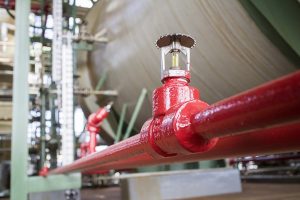
Prepare for freezing temperatures by checking your building’s sprinkler system to ensure your building and its occupants are safe this winter.
Freezing sprinkler systems are always a big issue in the winter, and this season is expected to bring freezing temperatures. We’ve already seen the first snow of December, but before the next snow storm hits the East coast, it’s essential to prepare your sprinkler systems for the freezing weather. The following checklists are for general and wet sprinkler systems, antifreeze systems, and dry systems. Follow the list of the type of sprinkler systems your building has to ensure your building is safe this winter.
General Building and Wet Sprinkler Systems
Frozen sprinkler systems pose a huge risk to your building and its occupants, as a frozen system won’t work in the event of a fire if the pipes are frozen. The best ways to keep your sprinkler system safe is to provide preventative maintenance. On your checklist for general building and wet sprinkler systems should include:
- Ensuring the insulation is intact in the attic, soffits, and eves
- There are no open holes in insulated spaces where sprinkler or water lines run
- The doors are secured, and weatherstripping is intact on exterior doors, as well as on exterior sprinkler valve and water meter rooms
- All space heaters in the building are operational (but unplugged when no one is in the room,) and thermostats are properly set in exterior sprinkler valve and water meter rooms (at or above 40 degrees.)
- The heating is on in vacant spaces to keep the pipes at a reasonable temperature
- The insulation is intact in heated spaces
- Escutcheons are in place on heads that extend into unheated spaces
- The doors and roof hatches are secured in sprinklered stairwells
- Broken or leaking windows or doors are repaired
- The heat source was serviced within the last year
Antifreeze Sprinkler Systems
If your building has antifreeze sprinkler systems, ask yourself these questions:
- Has antifreeze solution been tested for proper freeze protection?
- Have any leaks occurred that may have diluted the antifreeze solution?
Dry Sprinkler Systems
If your building has dry sprinkler systems, ask yourself the following important questions:
- Is the air compressor functional?
- Are the gauges in their normal range?
- Has the system tripped since last winter?
- Have low points or drum drips been drained recently?
The Consequences Of Frozen Sprinkler Systems
Just like frozen plumbing pipes, frozen sprinkler systems can burst if frozen. This is a worst-case scenario, but there’s a problem even if the pipes don’t burst. A frozen system will not be able to work when needed, which puts your building and its occupants at risk during a fire event.
Fire Prevention and Protection Services from Fireline
Whether you need smoke detectors, fire extinguishers, or an automatic sprinkler system installed at your rental property, Fireline has you covered. We have been protecting people and properties from fire damage since 1947—and our experience shows in our excellent work! We are known for our wonderful customer service, our expertise, and our reliability. For more information on how we can help your residential or commercial property, visit us online or give us a call at (800) 553-3405. For more fire safety tips, be sure to follow us on Facebook, Twitter, LinkedIn, and Google+.
